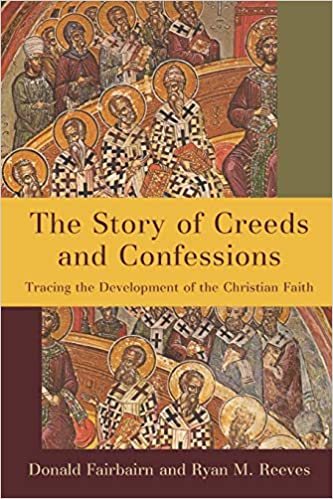A Brief Book Summary from Books At a Glance
by Steve West
About the Authors
Donald Fairbairn and Ryan Reeves both earned their PhDs from Cambridge, and they both teach at Gordon-Conwell Theological Seminary.
Introduction
This work does what the title of the book suggests: it tells the story of Christian Creeds and Confessions. Although some treatments of these topics can be dry, technical, or overly polemical, this book provides a narrative that is simultaneously interesting, accessible, and accurate. It covers a huge swath of material, but does so in a coherent and understandable fashion.
Table of Contents
1 The Beginning of the Story
PART 1 The Era of the Creeds (100-500)
2 The Creedal Impulse in Scripture and the Early Church
3 A Christian Empire and Creedal Standardization
4 The Nicene Creed: A Creed for the Entire Church
5 The Chalcedonian Definition: Explaining the Nicene Creed
6 The Apostles’ Creed: A Regional Creed with Traditional Authority
7 The Athanasian Creed: A Creedal Anomaly with Staying Power
PART 2 Exploring Creedal Theology (500-900)
8 Clarifying Chalcedon in the East
9 The West Charts Its Own Theological Course
10 Creedal Dissension and the East-West Schism
PART 3 From Creeds to Confessions in the West (900-1500)
11 Setting the Stage for Medieval Developments
12 Catholic Confessions in the High Middle Ages
PART 4 The Reformation and Confessionalism (1500-1650)
13 The Crisis of the Reformation
14 Early Protestant Confessions
15 New Generations of Protestant Confessions
16 Catholic and Orthodox Responses to Protestant Confessions
17 Protestant Confessions in the Late Reformation
PART 5 Confessions in the Modern World (1650-Present)
18 The New Grammar of Modern Confessions
Summary
Part 1: The Era of the Creeds (100-500)
There were various creeds in the first centuries of the church, and some evolved over time before assuming their final form. Although not originally a creed, the Shema of Deut. 6:4 came to function like a creedal statement, standing at the center of Israel’s faith. How Christ can be one with God yet distinct from God created complexity in the creedal affirmations of the NT, as did the addition of Christ’s life, death, and resurrection as creedal statements. Adding the doctrine of the Holy Spirit complicated things even further. We don’t have full texts of creeds in the second and third centuries, but we can reconstruct two types of creeds from extant sources: the first served as summaries of Jesus’ life, and the second was Trinitarian in structure.
Although the church always possessed the truth in the NT, the church did get better at expressing the truth over time; its theological reflection and articulation became sharper. Ignatius and Justin started with the earthly life of Jesus, but Irenaeus started with the Father, then considered the Son in relationship to him, and then moved to the Spirit. The former approach is like the Synoptics, whereas the latter is like John 1. Creedal confessions were often used at baptisms, and they were expanded to include not just statements about who the person believed in, but also things that they believed (e.g. the doctrine of the church). The Old Roman Creed is prototypical; there are also Eastern creeds from this early period.
Although there were pockets of intense, local persecution of Christians during the first few centuries of church history, there were only two periods of widespread persecution (one in the 250s and the other in the early fourth century). The latter persecution was instituted by Diocletian, a ruler who believed Rome was being punished for not adhering to the ancient gods. Diocletian eventually abdicated the throne, and a civil war resulted. Maxentius was a general who fought under the protection of the gods, and Constantine needed a god on his side to fight against Maxentius. Details of the account vary, but Constantine put the sign of Christ on his shield and won a decisive battle. People saw this as the triumph of Christ over the other gods. . . .
[To continue reading this summary, please see below....]The remainder of this article is premium content. Become a member to continue reading.
Already have an account? Sign In
